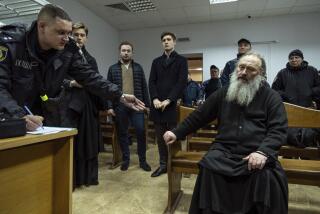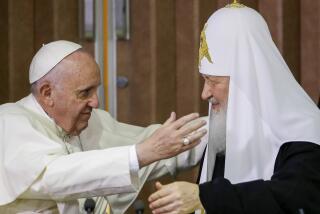Local Authorities Blamed : Orthodox Head Assails Soviet Religious Curbs
- Share via
MOSCOW — In an unusually frank interview with the Soviet press, the patriarch of the Russian Orthodox Church was quoted Friday as criticizing local authorities for failing to allow groups of observant Christians to be officially registered.
Religious groups in the Soviet Union must be registered before they can meet for prayer services and other observances related to their faith.
Patriarch Pimen, interviewed by the daily Izvestia, also was quoted as saying that young people are motivated to join in religious activities by a “thirst for moral values,” suggesting that officially sanctioned atheism has not been of much help to young people seeking moral guidance.
The interview was regarded as unusually candid because it dealt with a number of sensitive issues at considerable length.
Shown as Positive Force
It appeared to reflect a general relaxation in the official Soviet attitude toward religion. The Russian Orthodox Church recently has been pictured in the news media as a positive force in society, and two weeks ago, Russian Orthodox priests made an unprecedented appearance on Soviet television.
The article appeared as Russian Orthodox believers prepared to mark the church’s celebration of Easter Sunday, but it made no mention of the holiday. Instead, the interview was associated with the 1,000th anniversary of the founding of the church, which is to be observed in June.
Pimen was quoted as telling Izvestia that the church accepts the socialist nature of Soviet society and sees merit in official Soviet morality.
He also said the church is generally free in its religious activities but complained that, while central authorities hold what he described as an enlightened attitude toward the church, local authorities still pose a “persistent problem” by refusing to register communities of believers.
‘Especially Painful’
He was quoted as saying that the problem was “especially painful in areas where such (officially recognized) communities are totally absent.”
But progress is being made on the matter, he added. In the last year, 16 new religious communities in various regions have been registered.
The patriarch also was asked about the interest of young people in the church, a thorny issue in the Soviet Union, where believers are depicted mainly as older people.
Pimen responded that the church has no shortage of young recruits for seminaries and religious academies. In the last decade, he said, the clergy has been “entirely rejuvenated” by young people and the average age for priests is considerably lower than in the past.
When the Izvestia reporter suggested that young people are attracted to religion by an interest in obtaining an unvarnished view of history, the patriarch replied, “I think the fundamental urge is the thirst for moral values.”
Complaints Increase
In recent months the Soviet press has carried an increasing number of complaints about limits on the freedom of religious expression. An article in Izvestia in January, for example, noted that “the old syndrome of prohibition has proved to be very tenacious.”
Such articles have tended to describe repression as a violation of state legality rather than as a religious matter. Others have shown the church in a sympathetic light.
More to Read
Sign up for Essential California
The most important California stories and recommendations in your inbox every morning.
You may occasionally receive promotional content from the Los Angeles Times.










